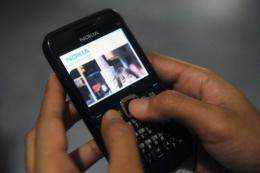Nokia, the world's top mobile phone maker, surprised investors with a much better-than-expected 2009 performance after it resolved product problems, sending its share price soaring.
Nokia, the world's top mobile phone maker, surprised investors Thursday with a much better-than-expected 2009 performance after it resolved product problems, sending its share price soaring.
Nokia said its smartphones contributed to its first rise in quarterly earnings in nearly two years while operating profit in the last quarter more than doubled from a year earlier.
The share price hit a session high of 10.43 euros in the day, buoyed by very favourable analyst comment on the results. It closed 9.87 percent higher at 9.91 euros on a positive Helsinki stock exchange.
For the three months to December, Nokia posted a net profit of 948 million euros (1.33 billion dollars), up 64 percent from a year earlier and compared with analyst forecasts compiled by Dow Jones Newswires for 620 million euros.
"Our performance in smartphones, combined with continuing success in the emerging markets, helped us increase sales in our Devices and Services unit, both quarter-on-quarter and year-on-year," Nokia chief executive Olli-Pekka Kallasvuo said in a statement.
The Finnish company reported a full-year net profit of 900 million euros (1.26 billion dollars) for 2009, down 78 percent from 2008, while sales dropped 19.2 percent to 41 billion euros as the global slump savaged consumer demand.
However, analysts said the company had done very well, holding up strongly through the year to maintain price levels and win market share.
"This was a very, very strong report overall," said Evli analyst Mikael Andersson. "The average selling price (of mobile phones) continued to stabilize and was actually up on the quarter ... and also, their market share is up."
Nokia said it sold 126.9 million phones in the quarter and estimated that its slice of the global mobile market rose to 39 percent from an estimated 37 percent a year earlier and 38 percent in the third quarter of 2009.
"This means Nokia has got rid of its component problems," said Andersson.
Kallasvuo told a conference call that the company had "worked through some constraints" relating to component availability "early in the quarter.
"I clearly feel we have a good portfolio at this point in time ... and we need to have a great portfolio going forward," Kallasvuo said, adding Nokia aimed for its mobile phone market share in terms of volume to remain flat this year compared to 2009 and to rise slightly in value.
The company, which posted its first loss in a decade in the third quarter, has suffered from rising competition in the smartphone market and from the global economic downturn, which has dented demand for consumer electronics.
Industry observers have said the outdated Symbian operation system, which drives Nokia smartphones, is one of the reasons many consumers prefer Apple's iPhone or Research in Motion's (RIM) BlackBerry, which are easier to use.
But Nokia said on Thursday that it had won ground in the global market for smartphones, with its share in the fourth quarter up at an estimated 40 percent from around 35 percent in the previous quarter, helped by new products, including touch phones.
"Apple continues to be a great competitor but we have our assets as well," Kallasvuo told the conference call.
Nokia said it sold around 20.8 million smartphones and mobile computers in the quarter.
"The biggest surprise was that they managed to hike their market share in smartphones, which have been seen as Nokia's weakness," Nordea analyst Martti Larjo said.
In the last three months of 2009, Nokia's net sales slipped five percent year-on-year to 12 billion euros but beat market expectations as the average selling price rose by one euro from the previous quarter to 63 euros.
The Nokia Siemens Networks joint-venture the Finnish company owns with Germany's Siemens reported an improvement in its operating margin in the fourth quarter versus a year ago, and Nokia said it expected the business to continue to grow faster than the market in 2010.
Nokia, which employed 123,553 people at year-end, proposed a dividend of 0.40 euros to be paid to shareholders for 2009.
(c) 2010 AFP





















